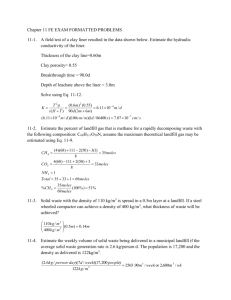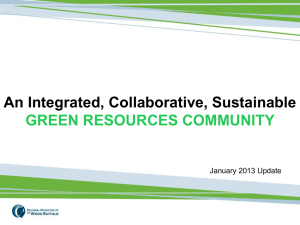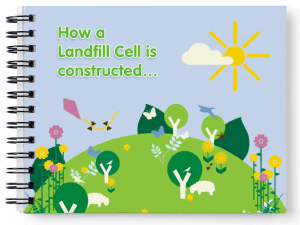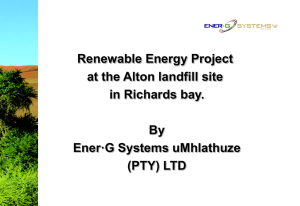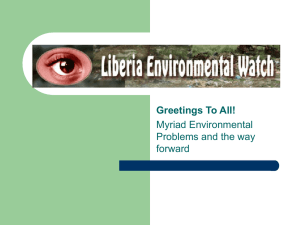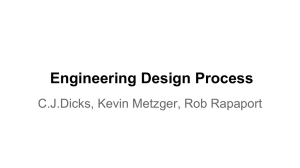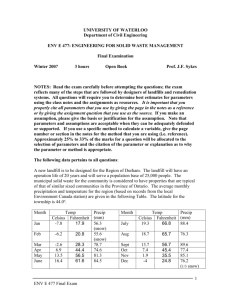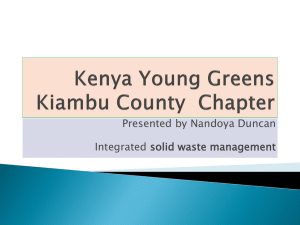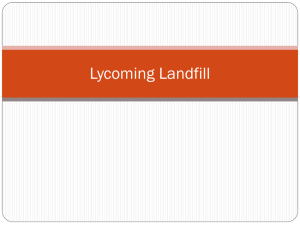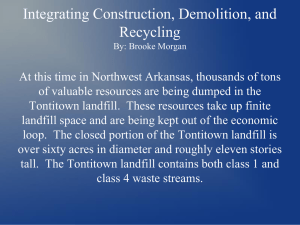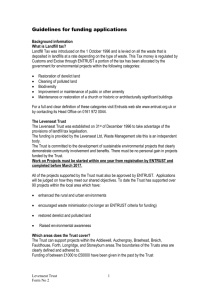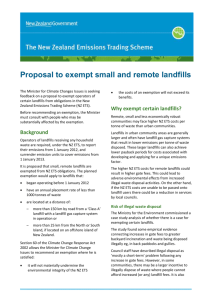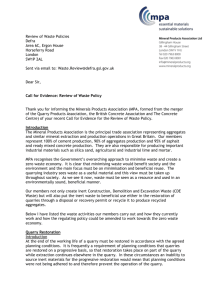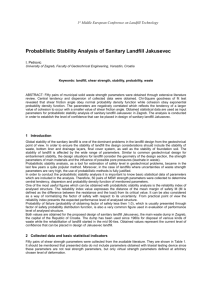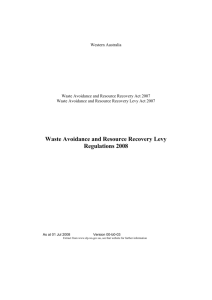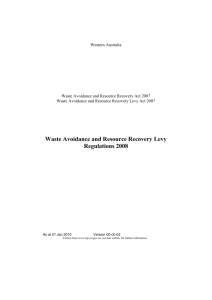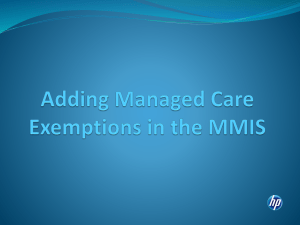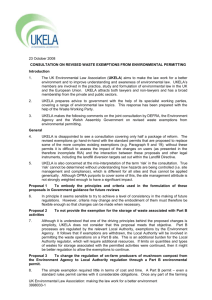Legal Update June 2012
advertisement
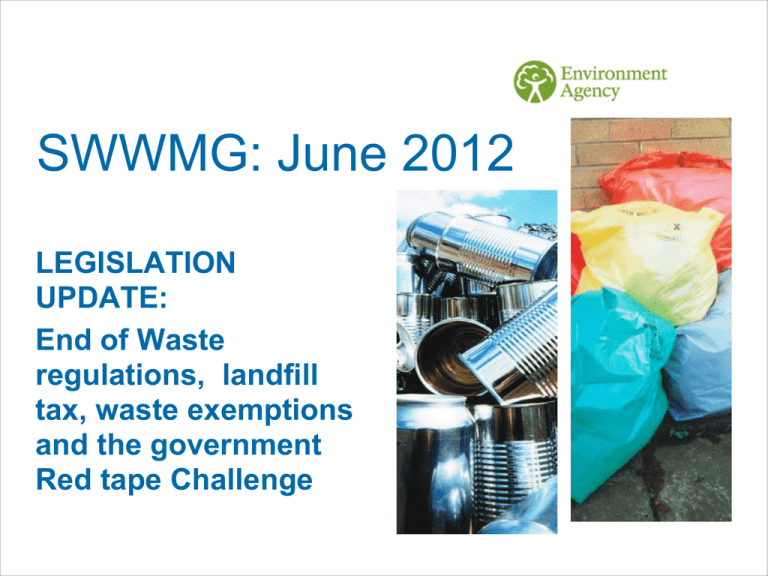
SWWMG: June 2012 LEGISLATION UPDATE: End of Waste regulations, landfill tax, waste exemptions and the government Red tape Challenge End of Waste: determined using one of 3 methods - compliance with end of waste regulations - Meeting a Quality protocol - through an end of waste submission End of Waste Regulations for scrap metals EC published its Regulations on End of Waste for scrap Iron, steel and aluminium on 8th April 2011. th Came into direct effect on 9 October 2011 It defines the point at which iron, steel and aluminium scrap metal can cease to be waste When does scrap iron, steel and aluminium cease to be waste? When they have undergone treatment and meet the requirements laid down in the regulations which include: The producer of the output must issue a statement of conformity for each consignment of material which has met the relevant criteria. The producer must implement a QMS which complies with the regulations. The QMS must be verified every 3 years by an independent outside body that has been accredited by UKAS. Impacts on metal waste packaging Accredited reprocessors/exporters who are able to issue PRNs/PERNs can only do so on material they receive which is still waste Material which has ceased to be waste in line with the End of Waste Regulations will not be eligible to have PRNs/PERNs raised against it. Further Information The full text of the regulations and advice/information can be found at http://www.environmentagency.gov.uk/business/regulation/129311.aspx Quality protocols The programme is not developing any further protocols but will review published ones and continue to work on those already started. Where possible, we produce a quality protocol for each waste material, which clearly explains what has to be done to produce a fully-recovered, non-waste, quality product. The project is a partnership between us, WRAP, Northern Ireland Environment Agency and Welsh Government End of Waste Submissions Do you process waste to produce a product? Does it meet the end of waste test? Complete an end of waste submission for EA consideration We will assess whether the waste has been converted into a distinct and marketable product, can be used in exactly the same way as non-waste and can be stored and used with no worse environmental effects when compared to the raw material it is intended to replace. Landfill Tax Changes On 18th May 2012 HMRC announced an increase in landfill tax rates for certain wastes from the lower rate of £2.50/tonne to the full rate of £64/tonne. Sparked waves through the industry HMRC issued further guidance on 1st June 2012. Landfill tax HMRC clarified that materials that fall outside those listed within the Landfill Tax (Qualifying Material) 2011 Order or fail to meet the necessary conditions (for example, they contain contaminants) would continue to be liable for the standard rate of Landfill Tax if disposed of to landfill. HMRC confirmed that inspection of loads is the responsibility of the landfill operator and where they do not hold appropriate evidence to support the lower rate of Landfill Tax assessments will be made to bring the under-declared tax into charge. Waste Exemptions A waste exemption is a very specific type of low risk waste handling operation that does not require a permit. Most exemptions need to be registered, usually by the EA. On the 6 April 2010 new regulations came into force that completely changed the waste exemption system. Waste exemptions registered under the old system are transferring across to the new system over a period of between 18 months to three-and-a-half years Waste Exemption Categories Use (16) Treatment (33) Disposal (8) Storage (3) – there are also 3 non waste framework directive exemptions which do not require registration April 2012 transitions Para 13 exemption (construction and soil materials): move to T5 (screening and blending of waste) and/or T6 (treatment of waste wood and waste plant matter by chipping, shredding, cutting or pulverising) by 6 April 2012. Para 21 exemption (preparatory treatment of waste plant matter) move to T6 by 6 April 2012 Para 12 exemption (storage and composting of biodegradable waste) move to a permit from 30 April 2012 or T23 (Aerobic composting and associated prior treatment) Transfer to the new system As of 1 October 2012 a further 22 old exemptions will need to move over to the new system or will require a permit. These include para 20 (recovery of textiles) which will move to a T2, para 15 (use of waste) which will move to U8 (use of waste for a specified purpose) and para 40 (repair or refurbishment of WEEE) which will move to a T11 (chargeable) Red Tape Challenge The government launched the Red Tape Challenge in April 2011 to look at how we can reduce the overall burden of regulation It will close in April 2013 6 cross cutting themes including environment 73% of Environment regulations will be scrapped or improved – a simpler and smarter approach will save business at least £1billion over 5 years, whilst maintaining important protections Environmental Theme proposals Spotlight period in September 2011. Of 255 regulations, 132 will be improved, 70 will be kept as they are and 53 obsolete regulations will be removed. Proposals subject to further public and stakeholder consultation. Waste transfer notes: review of system to allow businesses to use other forms of evidence such as invoices etc. Hazardous waste: simplify the process Waste Carriers, Brokers and Dealers: registration requirements Producer Responsibility Obligations: exempt more businesses from the battery producer responsibility regulations Site Waste Management Plans: proposal to remove the regulations Further details: http://www.redtapechallenge.cabinetoffice.gov.uk/home/index/ Thank You Tessa Bowering Senior Environment officer Direct dial: 01258 483416 Tessa.bowering@environment-agency.gov.uk
